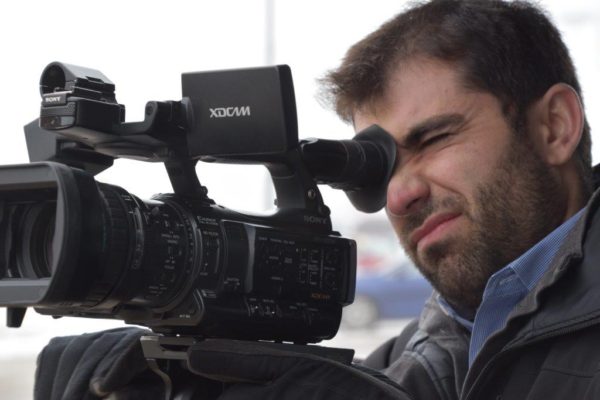“Census Bureau gets love-bombed.” “Climate change protesters put giant surgical mask at entrance to Republican National Committee headquarters.” “Biden sells hand sanitizers labeled with his economic plan.”
Political reporter Gabriel Rubin, AB ’15, is satisfying readers’ hunger for an inside and sometimes irreverent look at the capital’s comings and goings with his weekly column Washington Wire in the Wall Street Journal.
The Friday column begins with news from the week in succinct, Twitter-type nuggets and ends with Minor Memos — the snippets Rubin considers to be the quirkiest activities. “We want to make sure people understand that Washington isn’t all House of Cards. It’s also a lot of Veep.”
Founded in 1940, Washington Wire is one of the oldest columns in American journalism. Barney Kilgore, who is credited with inventing the modern Journal, also created Washington Wire. His idea was to offer something for every reader: politics, energy and national security as well as more informal, light-hearted items.
The column ran every Friday from its first appearance until 2007, when it went dormant following a digital rebrand. In 2019, editor-in-chief Matt Murray relaunched Washington Wire in the run-up to the Journal’s 2020 political coverage. And he named Rubin as its author.
“Seeing this column in print has been exciting,” Rubin says. “It connects me to the history of the paper.”
Rubin’s career began at Morning Consult, a research data company, where he reported on financial regulation issues. An editor at the Journal saw Rubin’s work and invited him to lunch. Soon, Rubin was working at the Journal full time. Initially, he covered financial regulation and some quirkier topics such as Bob Dylan’s refusal to attend the Nobel Prize ceremony and the growing trend of customized caskets, both of which appeared on the front page. He switched to covering politics in 2019.
“I feel like we’re at an inflection point in history where it’s important to cover politics in as granular detail as possible,” he says.
Obviously, 2020 political coverage has not been business as usual. “With the pandemic, economic crisis and racial justice protests, the campaign can almost seem to recede into the background,” Rubin says. He’s also taken on new reporting duties depending on what the newsroom needs.
“I’ve gotten a chance to talk to leaders in fields like economics, public health and beyond about how to meet these challenges,” he says. And despite the seriousness of these issues, he still tries to find irreverant stories.
“It’s an interesting balance of taking the job extremely seriously to make sure we get the story right, while at the same time, having fun with it and realizing that I’m interviewing people who are creating our history. As a former history major, that’s pretty fun and exciting to do every day.”
Rubin, who double-majored in history and Spanish in the College of Arts & Sciences, began writing about politics in high school, when he created a political magazine. “When I visited WashU as a prospective student, I picked up the current issue of the Political Review, and I knew exactly where I wanted to be.”
He was able to get involved early, publishing articles during his freshman year. Four years later, Rubin honed his writing and research skills while drafting his senior thesis. He devoted countless hours to combing through old newspapers, what many historians refer to as “the first draft of history,” all while working closely with his mentor, the late Maggie Garb, professor of history in Arts & Sciences.
“I had the opportunity to work with faculty who pushed me. I learned to research deeply and to never be satisfied with a small number of sources,” he says. These are skills Rubin uses every day at the Journal.
“I feel a responsibility to make sure that in the future, whether that’s a week from now or in 100 years, our readers have as full and accurate a view of this era as possible,” Rubin says. “It’s fun to think that one day a WashU student may be reading my articles and treating them as the first draft of history.”


